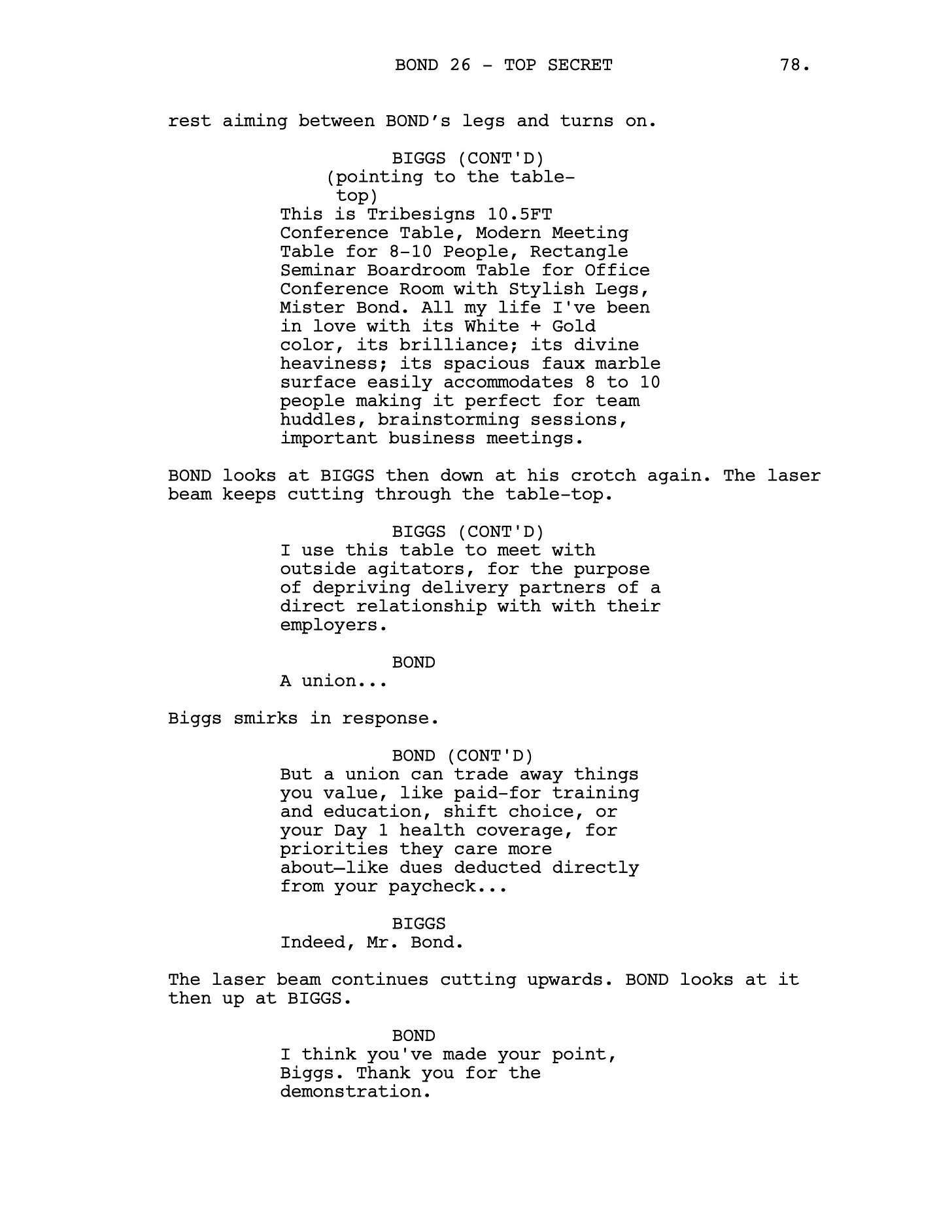Greetings from Read Max HQ, suffering through the New York Department of Education’s unholy “mid-winter break.” A shorter newsletter today, covering:
The “anti-crypto constituency”: Does it exist? Where, and, maybe more importantly, when?
A Read Max EXCLUSIVE: two pages from a draft script for the new, fully Amazon-controlled James Bond movie.
A reminder: Week in and week out, even weeks where for some godforsaken reason my son is not in school, I produce around 5,000 words for the entertainment, and, sometimes, by accident, the edification of readers. I’m able to make time to do this because a little more than 3,000 of my 50,000 subscribers elect to pay, which not only earns them access to the paywalled recommendations, but also subsidizes the research, reporting, thinking, shitposting that goes into the weekly newsletter. If you read Read Max and enjoy it--if you find it engaging or educational or halfway decent at occupying you when you’re waiting in line--please consider paying to subscribe, for the low price of about one beer a month or 10 beers a year
The anti-crypto constituency is coming soon
Paul Krugman has good newsletter today on the Trump administration “laying the foundations for the next financial crisis”:
This is, however, important. The Musk/Trump administration has been weakening financial regulation across the board. The Consumer Financial Protection Bureau, which aims to shield Americans from fraud, has been shut down. All of the agencies that try to supervise and regulate financial institutions, other than the Fed, are now being run by people hostile to the very idea of regulation. Cryptocurrency, which is rife with fraud and scams — indeed, the whole thing may be a scam — is now being actively promoted by the executive branch. […]
The New York Times recently ran a heartbreaking story about how the president of a community-owned bank in Elkhart, Kansas fell for a crypto scam, destroying the bank and quite a few people’s life savings in the process. You can be sure that we’ll hear many more such stories once we reach the final stage of the cycle — the Minsky moment, when euphoria-driven asset price surges give way to fire sales as highly leveraged investors desperately try to raise cash. […]
Most observers believe that when — not if — the reckoning comes, it won’t be as bad as 2008. That’s probably true. It doesn’t look as if banks and quasi-banks are as exposed as they were back then, so there may be less disruption to the financial system. But one lesson from 2008 is that an ever-changing financial system sometimes creates risks that nobody realized were there until things fall apart.
Furthermore, a crisis doesn’t have to be as bad as 2008 to be very bad indeed.
Crypto markets have been ripping since 2023, defying the predictions of people who (like me) believed that the mid-pandemic web3 boom was a product of low interest rates and investor boredom. This surge has had some obvious political consequences, one of which is the emergence of a vocal and passionate pro-crypto constituency of mostly young men--forty-two percent of men between 18 and 29 have invested or traded in cryptocurrency--who have either become meaningfully richer through their investments, or hope to become meaningfully richer soon.
Because of their shared anti-regulatory, pro-scam values, this constituency has naturally aligned with the Republican party, posing a problem for Democrats. As Josh Brown put it last year, “there is no anti-crypto constituency… Literally no one else cares. They may not trust crypto currencies or want to be involved with them, but they certainly do not get animated by their existence or start writing checks to the politicians who want to eradicate the space. All of the energy is on the other side.”
Short-term calculations around the dynamic described by Brown led to a fair amount of hand-wringing among Democrats during the campaign--Should Kamala Harris speak at the Bitcoin 2024 conference?--and some very consultant-brained ideas like announcing initiatives to “protect cryptocurrency investments so Black men who make them know their money is safe.” As Krugman writes, “politicians are subject to the same mood swings as investors, so they tend to push regulators to loosen up precisely when they should be trying to rein in irrational exuberance.”
I tend to believe in heavy cryptocurrency regulation on the merits. But even Democrats who are crypto-friendly might consider Krugman’s point: a crisis is likely coming, and even a narrowly felt one could be quite bad. Ultimately the theorized short-term benefit of Harris presenting herself as crypto-curious never materialized, and now that Democrats are out of power and years away from another presidential election, it’s hard to see why they should do anything but demand more and better regulation. There is a long-term political benefit in (1) being right about crypto and (2) not being in bed with a bunch of scammers, frauds, creeps, and bankers. After all, a pro-crypto constituency is only one bad crash away from being an anti-crypto constituency.
New script pages from Amazon’s James Bond
Barbara Broccoli and Michael Wilson, longtime producers of the James Bond series of films, announced yesterday that they would hand over creative control of the films to a joint venture with Amazon. Broccoli and Wilson, who took over the ownership of the Bond character from their parents, had been engaged in a protracted feud with Amazon, which bought release rights to the Bond series when it purchased MGM three years ago:
To friends, Broccoli has characterized her thoughts on Amazon this way: “These people are f— idiots.” […] Broccoli has complained that Amazon isn’t a good home for Bond, since the company’s core business is selling everything from toilet paper to vacuums—a perspective Amazon executives find unfair. But since she makes the creative calls that come first—script, casting, story—Broccoli can hold Bond hostage from Amazon for as long as she sees fit.
Before the purchase closed, Amazon executives brainstormed among themselves how Bond could be plugged into their machine. Would Amazon produce a James Bond TV show for its Prime Video service? What about a Moneypenny spinoff? Or a TV spinoff centered on a female 007? […] Broccoli was irked in one early meeting when Salke referred to James Bond by a dreaded word: “content.” Using such a sterile term, one friend reflected, was like a “death knell” to Broccoli.
Whatever agreement Broccoli and Wilson reached with Amazon seems to have ended the dispute in favor of Amazon, which will now have control over decisions like casting and spin-off franchises. Some fans have suggested this marks the end of the Bond they knew, as Amazon’s more cautious and bottom line-focused operation takes over production.
But fear not--Read Max has obtained two pages from a working draft of the script for the next Bond movie, and I’m pleased to report that it’s impossible to tell the difference. Read them below, EXCLUSIVELY ON READ MAX:
Wow! Can’t wait!









A commercialized but ultimately earnest form of chauvinistic masculinity is seen as a way to reach new markets so tech nerds attempt to acquire the symbol and aesthetic of said masculinity in order to sell it back to himbos as a collection of empty signifiers of what masculinity (supposedly) was in the past?
I mean, what other year would it have made MORE sense for the Brocoli’s to broker this deal with Amazon?
> "To friends, Broccoli has characterized her thoughts on Amazon this way: “These people are f— idiots.” […] Broccoli has complained that Amazon isn’t a good home for Bond, since the company’s core business is selling everything from toilet paper to vacuums—a perspective Amazon executives find unfair."
LoL -- Amazon, the purveyors of quality. As Barnum of Barnum and Bailey (?) once quipped, "No one ever went broke underestimating the tastes of the American public."
Though I recollect that some wag argued that the failure of some extreme sports league there disproved that thesis.